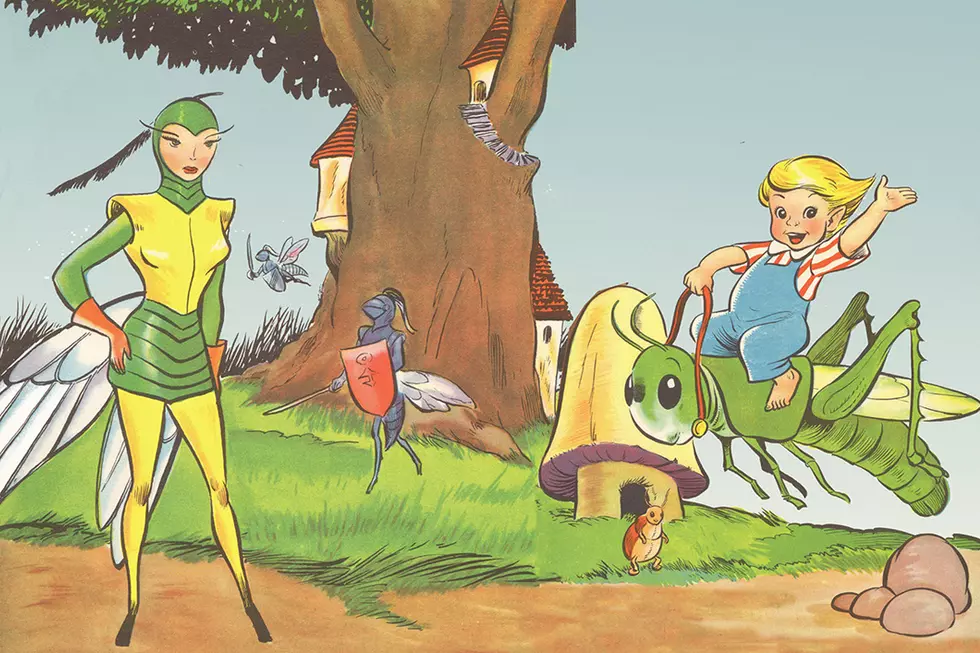
Born 102 Years Ago Today: We Have Met the Maestro, And He Is Walt Kelly
If a reader today is at all familiar with Walt Kelly's long-running comic strip Pogo, their familiarity may simply be with the most widely circulated quote from the strip, “We have met the enemy, and he is us,” which appeared in the strip in 1970 and the same year on a poster for the first Earth Day celebration, and was repeated in 1971. But just as there is much more to this simple quote — which appeared over twenty years into the strip's run — than a simple environmental message, there is so much more to Pogo, the masterwork of one of the greatest cartoonists ever to have lived.
Walter Crawford Kelly, Jr, was born on this day in 1913 in Philadelphia, but shortly thereafter his family moved to Bridgeport, Connecticut, and it's not hard to imagine Kelly being imbued with the sense of pomp and showmanship of Bridgeport's most famous son, PT Barnum, whose biography Kelly would later illustrate.
As a young man, Kelly moved to California to work at Disney Studios, where he worked as an animator on such films as Pinocchio, Dumbo, and Fantasia. When animators went on strike in 1941, Kelly left the studio, and — to our everlasting boon — went to work in comics.
Kelly went first to Dell Comics, where he wrote and drew various stories for collections of Christmas stories and fairy tales, in addition to producing a series based on the Our Gang films (perhaps better known today as the Little Rascals) and drawing covers and stories featuring well known Disney characters; Raggedy Ann and Andy, Uncle Wiggily, and more.
It was in a 1942 issue of Dell's Animal Comics that Kelly would strike upon his most popular characters. Pogo the Possum and Albert the Alligator appear as supporting characters to a young human child named Bumbazine in a story called “Albert Takes the Cake,” but soon Bumbazine leaves the strip and the animals take over. When Kelly was asked to contribute a daily strip to the New York Star in 1948, Pogo and pals were who he brought with him.
From 1948 until his death in 1973, Kelly built up his world, a fictionalized version of Okefenokee Swamp in Georgia, and much like George Herriman's Coconino County and Al Capp's Dogpatch, the sprawling landscape of swamps and trees and brambles became like a character unto itself.
Not that the strip needed another character: Pogo was packed to the gills with fully realized characters from the main cast — Pogo and Albert, of course, but also Howland Owl, Cap'n Churchy LaFemme, Porky Pine and Beauregard Bugleboy — to the literally over one thousand supporting and guest characters, like Sarcophagus MacAbre the undertaker and Chug Chug Curtis, the natural born mailman, down to the smallest boll weevil and swamp sprat.
The craftsmanship of the strip is unmatched: flawlessly clean lines and beautifully rendered textures, expressive figures that point to Kelly's background in animation, clear and emotional acting on every character's face, and backgrounds that are every bit as lovingly drawn as the figures. Nothing in comics has ever looked as beautiful as a Walt Kelly tree, and that is a fact.
The only thing that could match the level of quality of the art in Pogo is the writing. Walt Kelly was a poet of the nonsense school of Lewis Carroll and his mastery of wordplay is unmatched. His love of twisting language shows in the unique “swamp speak” of the animals of Okefenokee: a spell-binding admixture of genuine rural Southern dialect with a generous dollop of malapropism, naivete, “human” foibles, and satiric wit. Kelly's penchant for nonsense verse and parody can perhaps best be seen in his Songs of the Pogo album and the perennial Okefenokee Christmas favorite, Deck Us All With Boston Charlie:
Deck us all with Boston Charlie
Walla Walla, Wash, and Kalamazoo!
Nora's freezin' on the trolley,
Swaller dollar cauliflower Alleygaroo!
Don't we know archaic barrel,
Lullaby Lilla Boy, Louisville Lou.
Trolley Molly don't love Harold,
Boola Boola Pensacoola Hullabaloo!
The humor of the strip could range from broadly farcical to sharply satiric, as Kelly focused his lens both on the general failings of humankind and on more specific, topical subjects, most famously with Simple J. Malarkey, a blustering wildcat who bore a striking resemblance to a certain senator from Wisconsin who held sway in the 1950s.
However, even in its sharpest moments, Kelly's humor was rarely cynical, and his robust humanist philosophy always shone through.
Thanks to the ongoing efforts of Fantagraphics to collect every Pogo strip in order, it is perhaps easier than ever to dive into the lushly illustrated and brilliantly comic world of Walt Kelly's Okefenokee. Taking in such a masterwork can help us all so that we, in the words of Porky Pine, “don't take life so serious. It ain't nohow permanent.”
More From ComicsAlliance







![Our Boys: ‘Our Gang’ Vol. 4 and ‘Blazing Combat’ [Review]](http://townsquare.media/site/622/files/2010/04/book-covers.jpg?w=980&q=75)

